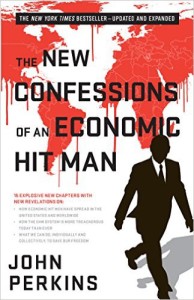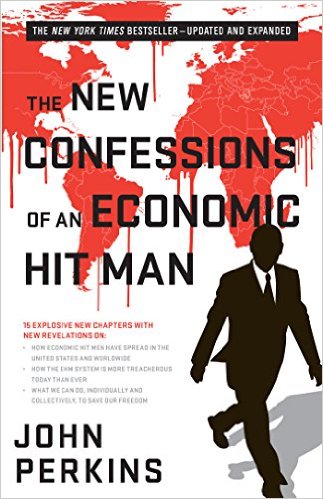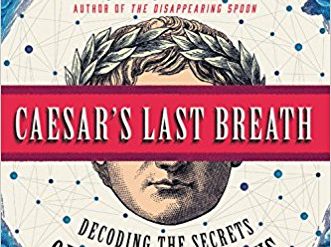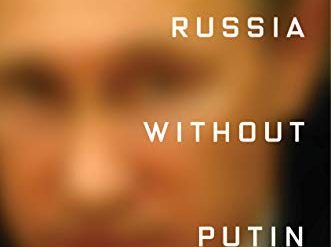
No one but the most hard-bitten defender of U.S. foreign policy would deny that the United States dominates a global empire bigger than any other in human history and that we have employed highly questionable and often illegal means to build it. In The New Confessions of an Economic Hit Man, author John Perkins explains some of the tactics at the root of America’s empire-building project. His book is based on decades of personal experience. Perkins analyzes those tactics — in a word, the insidious application of economic pressure backed by the threat of military action or even assassination — in a truly compelling account of his personal history. Anyone who seeks to understand how the United States came to have its far-reaching role in global affairs today should read this book.
Latter-day colonialism
Early in the 1970s Perkins was recruited by the National Security Agency but, at the urging of his recruiter, elected instead to take a job in private industry with a low-key Boston-based international consulting firm. There he played the role of an economist, although his only academic qualification to do so was an MBA. Perkins thrived in the new job, quickly rising through the ranks to become Chief Economist and the youngest partner in the firm’s 100-year history.
The New Confessions of an Economic Hit Man by John Perkins (2016) 385 pages ★★★★☆
As Perkins explains, his job was simple: to inflate the numbers in his projections about the economic benefits that would accrue from the construction of massive electrical generating projects designed by his company. As his mentor explained to him in the clearest of terms, he would become an “economic hit man” (EHM), one of a number of “highly paid professionals who cheat countries around the globe out of trillions of dollars.” He would accomplish this by encouraging “world leaders to become part of a vast network that promotes US commercial interests.” Perkins adds that “[i]f we faltered, a more malicious form of hit man, the jackal, would step to the plate. And if the jackals failed, then the job fell to the military.”
The specific purpose of Perkins’ exaggerated projections was to induce developing nations to sign up for enormous loans from the World Bank, USAID, and other U.S-controlled financial institutions. These loans would be used to pay high prices for construction and consulting services by U.S. companies, thus ensuring that virtually all the loan money came right back home. Since the projections would inevitably prove to be faulty, the loans would become unpayable after a few years, leaving the leaders of those countries in hock to the United States and incapable of denying its wishes. The result was that, against their will, the affected countries would be forced to host military bases, vote with the U.S. at the United Nations, and otherwise act much the same as they would if they were colonies of a European power.
Updating the story
The New Confessions of an Economic Hit Man is an updated and enlarged edition of Perkins’ 2004 New York Times bestseller, which sold 1.25 million copies and was translated into 32 languages. The new version is significantly different from the original. Thirty-three of the book’s 47 chapters are in Parts I through IV, which describe the author’s life and work from 1963 to 2004. These chapters are substantially the same as they were in the original, although Perkins has added detail that was lacking.
Chapters 15 and 16, which describe the Faustian bargain between the United States and Saudi Arabia, strike me as especially important. If you’re wondering why the U.S. ignores the inexcusable mistreatment of women in Saudi Arabia, or why our government secretly flew all the members of the bin Laden family back home immediately after 9/11, you’ll understand once you’ve read these chapters.
The concluding 14 chapters, Part V, 2004-Today, are entirely new; they add nearly a third to the book. Although Part V includes a fair amount of narrative about Perkins’ own experiences since 2004, it’s dominated by the concluding six chapters, which consist of Perkins’ analysis and his recommendations for “Things to Do.” It was in Part V that I found myself disappointed.
When does a writer know when to stop?
Perkins’ account of his experiences as an economic hit man is compelling. The details he relates about face-to-face meetings with coworkers and dissidents alike are impossible to dismiss: I too have traveled a good deal around the world, especially in developing countries, and I’ve had similar experiences along the way. And I’ve observed first-hand some of the diabolical practices he describes.
However, when Perkins strays from his story and struggles to place it in a larger historical context, he comes up short. Parts I through IV tell a great story, and it’s well told. A few of the chapters in Part V help bring that story up to date. Perkins’ use of the term “economic hit man” beautifully points to the truth behind the work he did, work that so many others have engaged in. However, Perkins expands the definition of EHMs to include corporate executives, investment bankers, lawyers, and lobbyists at work in the United States today. This exercise stretches the term beyond the breaking point.
Are economic hitmen responsible for all our problems?
Without question, our society suffers greatly from “skyrocketing student debt caused by state and federal cuts in public education, the constantly increasing medical debt resulting from deficient national health care and insurance policies, predatory payday loans, tax laws that subsidize a few of the richest at the expense of the many, and the outsourcing of jobs to other countries.” But to claim that all these problems result from the work of economic hit men makes no sense. Our society is far too complex, and our problems can’t be explained away so easily. Perkins would have been better advised to stick to his story and avoid reaching into areas where his personal experience is lacking.
The concluding chapters “What You Can Do” and “Things to Do” compound the problem by suggesting a laundry list of irrelevant or trivial suggestions that readers might follow to right the world’s wrongs. For example, Perkins recommends that students “Understand your passions” and “Join organizations.” The book would have been stronger without this sort of thing.
Disclaimers (plural)
John Perkins and I go back a long way. When he arrived in Ecuador with his first wife in 1968 to begin service in the Peace Corps, I had been in-country for nearly three years. I even have a vague memory of meeting him sometime during that last year of my Volunteer service. We reconnected, probably in the 1990s or early 2000s, when we met at a conference of the Social Venture Network, of which we were both members. We found ourselves in the same room again in 2003 or 20004 at Berrett-Koehler, the publisher we share, in the run-up to the publication of the original Confessions of an Economic Hit Man. John was there to meet with the publisher’s staff in preparation for the book’s release, and I was working on a series of books about socially responsible business.
Then, last year, I was retained by Berrett-Koehler as one of several advance reviewers to critique a draft of the book. The final product is different from the version I read then, but not nearly enough to suit me, since I criticized the manuscript in much the same manner as I have the finished book in this review. (I had a few additional complaints that I won’t share here, because I’ve said enough.)
The facts are here. Only the historical analysis is far-fetched.
Relating all this information serves two purposes: first, to make my bias clear; and, second, to attest to John’s credibility. His book might seem a stretch, but knowing him as I do, I would be astonished if it weren’t all true, a few errant memories and minor errors of fact notwithstanding. I find fault with the book only in his free-wheeling historical analysis. The loud objections that issued forth from establishment circles in response to the original edition of the book only served to confirmed the essential truths behind his story.
About the author
John Perkins has written or edited four nonfiction books about the experiences and issues described here, plus five books about shamanism and indigenous cultures, largely based on his experiences in the Amazon and the Andes.
For more reading
This book is one of Two dozen excellent memoirs. You might also enjoy Great biographies I’ve reviewed: my 10 favorites.
Like to read books about politics and current affairs? Check out Top 10 nonfiction books about politics.
And you can always find my most popular reviews, and the most recent ones, on the Home Page.



























